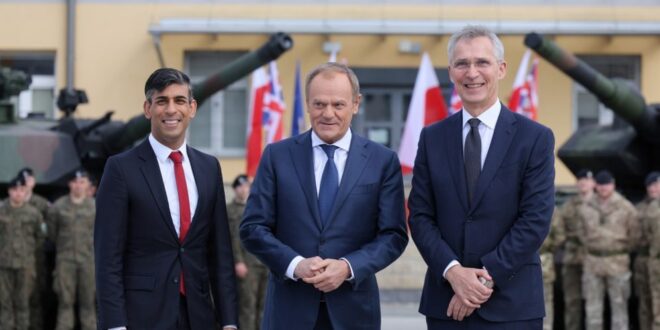The British PM chose Warsaw as the place to announce the UK would significantly ramp up its military spending, with more weapons headed to Ukraine to help its war effort.
“I’m announcing that the UK will be increasing defence spending up to 2.5 per cent of GDP by 2030,” British Prime Minister Sunak told a joint press conference with his Polish counterpart Donald Tusk and NATO Secretary General Jens Stoltenberg in Warsaw.
“We are putting our defence industry on a war footing,” Sunak added, saying that Ukraine would receive a similar level of support as currently for as long as necessary.
The UK would provide an additional 500 million pounds (579 million euros) in additional military funding to Ukraine, as well as weapons and ammunition, in what will be its largest ever military support package for Ukraine, the UK announced on Monday, ahead of Sunak’s two-day trip first to Warsaw, then Berlin.
The extra half a billion pounds ceremoniously announced in Warsaw brings the total UK military funding for Ukraine this financial year to 3 billion pounds, the British media reported. As well as the money, Sunak has committed to sending 400 vehicles, over 1,600 missiles, 4 million rounds of ammunition and 60 boats to Ukraine.
The fresh money comes at a difficult moment for Ukraine. Last year, a long-awaited Ukrainian counteroffensive did not bring the expected results and, since then, Russia has been continuously attacking and securing minor advances on the battlefield. The Ukrainian government expects Russia to step up its offensive in late May-early June.
On Saturday, the US Congress finally approved a delayed 61-billion-dollar aid package for Ukraine. But on Monday EU leaders failed to agree on sending more Patriot systems to Ukraine, although they did commit to looking into ways of providing more air defence urgently.
Warsaw’s role
“The talks held at my chancellery office, together with Mr Prime Minister and Mr Secretary General, are part of my mission of rebuilding – or even expanding – Poland’s role when it comes to security policy,” Tusk said at a press conference on Monday to announce the visits of Sunak and Stoltenberg on Tuesday.
While Poland has been a staunch Ukraine ally since the start of the war, the new pro-EU government and Tusk’s experience as a former European Council president make further space for the country to take on a higher profile in directing the foreign policy of the bloc, particularly in regards to the war in Ukraine.
In the run-up to the visits – although not necessarily planned this way – President Andrzej Duda told Polish newspaper Fakt that, “Poland is ready to host a nuclear weapon of NATO, if this were the decision of our allies, to locate it here as part of nuclear sharing.”
Kremlin spokesperson Dmitry Peskov immediately responded by saying that “Russia will take all the necessary retaliatory steps to guarantee our security” and that they were looking into the matter.
Tusk, who appeared to be caught off guard by Duda’s remarks, invited the Polish president for talks on the matter, adding: “I want Poland to be safe and well armed, but I would also like any initiatives to be very well prepared by the people responsible for them and for all of us to be convinced that this is really what we want.”
Three NATO countries have nuclear weapons (France, the UK and US) and, out of these, the US has been offering to share out its arsenal to partner countries. As of 2009, Belgium, Germany, Italy, the Netherlands and Turkey have been hosting US nuclear weapons. Last year, Belarus started hosting Russian nuclear weapons and it is suspected that some part of Russia’s arsenal is located in the exclave of Kaliningrad, on Poland’s northern border.
 Eurasia Press & News
Eurasia Press & News



